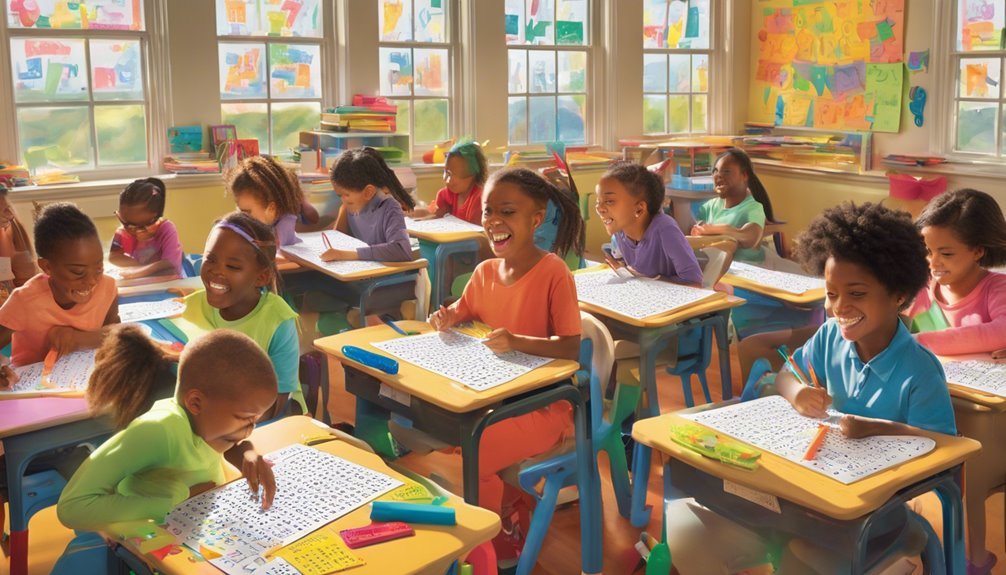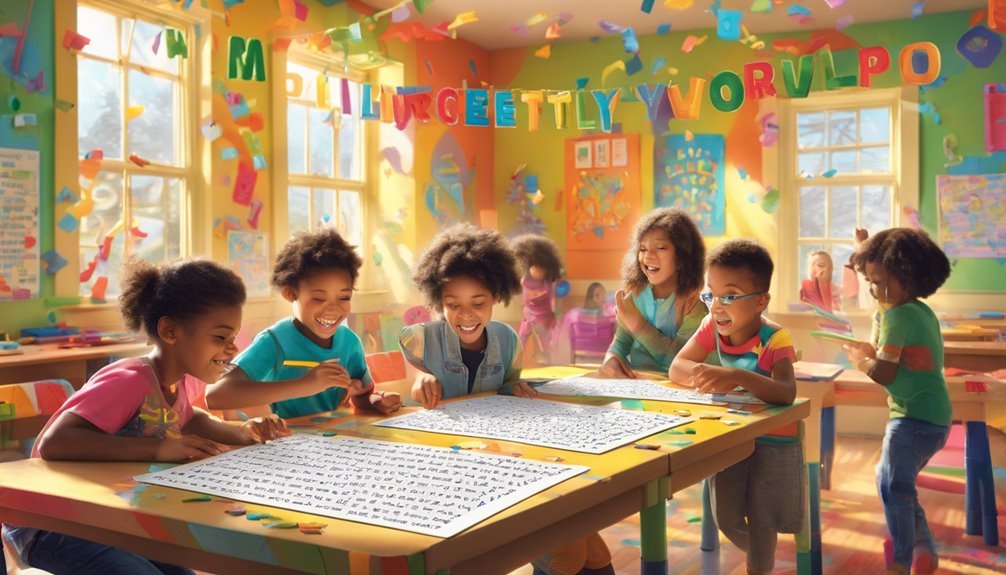Word search puzzles might seem like just a fun pastime, but they're actually a powerhouse for developing essential skills in kids. As you guide children through these grids, they learn to spot patterns and make connections that are vital for their cognitive growth. You'll soon discover how this simple activity can enhance their vocabulary and problem-solving abilities, paving the way for more complex learning challenges ahead. What's the secret behind their effectiveness?
Key Takeaways
- Word search puzzles enhance visual scanning skills, helping children identify and recognize patterns in letter arrangements.
- Engaging with word searches fosters spatial awareness, allowing kids to see relationships between words and their placements.
- As children search for words, they develop a better understanding of spelling patterns and letter sequences, reinforcing pattern recognition.
- Completing puzzles boosts confidence, encouraging kids to tackle more complex patterns in future learning activities.
- The interactive nature of word searches caters to different learning styles, making pattern recognition a fun and engaging process.
The Importance of Pattern Recognition in Cognitive Development
Pattern recognition is like a secret code that kids unlock as they grow, playing a vital role in their cognitive development. As you encourage your child to engage in activities that promote pattern identification, you're helping them sharpen essential cognitive skills.
Recognizing patterns isn't just about spotting shapes or colors; it's about understanding relationships and making predictions. This foundation supports their problem-solving abilities, critical thinking, and even math skills.
When kids can identify patterns, they're better equipped to tackle complex tasks and learn new concepts. So, whether it's through games, puzzles, or everyday situations, fostering this skill can make a significant difference in your child's cognitive journey.
You're not just playing; you're paving the way for their intellectual growth.
How Word Search Puzzles Work
Engaging with word search puzzles is a fun and effective way for kids to enhance their pattern recognition skills. The word search mechanics involve arranging letters in a grid, where words can be hidden in various directions—horizontally, vertically, or diagonally.
As you search for words, you develop critical skills in visual scanning and spatial awareness. The puzzle difficulty can be adjusted by changing the size of the grid or the complexity of the words. Starting with simpler puzzles helps build confidence and gradually increases challenge levels.
Enhancing Vocabulary Through Word Search Activities

While you search for words in a puzzle, you're not just having fun; you're also expanding your vocabulary in exciting ways. Each new word you find introduces you to different meanings and contexts, creating a rich tapestry of language. As you uncover words, you also develop skills in using context clues, enhancing your understanding of how words fit together.
Here's a quick look at how word searches support vocabulary expansion:
| Word | Definition | Context Clue |
|---|---|---|
| Curious | Eager to learn | "He asked many questions." |
| Adventure | An exciting experience | "They went on a thrilling journey." |
| Explore | To investigate | "She loved to discover new places." |
Engaging with these puzzles makes learning feel like an adventure!
The Role of Spelling in Pattern Recognition
As you uncover new words in word search puzzles, you're not only boosting your vocabulary but also sharpening your spelling skills. Engaging with these puzzles encourages you to notice spelling patterns, helping you make vital pattern connections between letters.
By employing effective spelling strategies, like breaking words into smaller parts or identifying common prefixes and suffixes, you enhance your ability to recognize and remember how words are formed. This practice supports your overall literacy and cognitive development.
Each time you search for a word, you reinforce your understanding of letter sequences and their arrangement, which is crucial for mastering spelling. Ultimately, this combination of fun and learning makes word searches a powerful tool for your educational journey.
Developing Problem-Solving Skills With Word Searches

Tackling word search puzzles sharpens your problem-solving skills in a fun and interactive way. As you hunt for hidden words, you're not just searching; you're engaging in critical thinking.
Each puzzle requires you to analyze patterns, make connections, and apply logical reasoning to decipher the layout. You develop strategies, like scanning rows and columns, to efficiently locate words, enhancing your ability to solve complex problems.
This practice also encourages perseverance, as you learn to overcome challenges when a word seems elusive. By consistently working through these puzzles, you're not only boosting your vocabulary but also honing skills that are essential for academic success and everyday life.
Embrace the challenge, and watch your problem-solving abilities grow!
Engaging Different Learning Styles With Puzzles
Engaging in word search puzzles can be a delightful way to cater to various learning styles, ensuring that every child finds a method that resonates with them.
For kids who thrive on visual spatial learning, the colorful grids and patterns offer a stimulating challenge that sharpens their observational skills. They can visually scan for words, enhancing their ability to recognize shapes and alignments.
Meanwhile, children with strengths in auditory processing can benefit from discussing the puzzles aloud, verbalizing strategies, and sharing discoveries with peers. This interaction not only reinforces their learning but also builds communication skills.
Creating a Fun Learning Environment

Creating a fun learning environment is key to sparking kids' enthusiasm for learning, and word search puzzles can play a significant role in that. By integrating interactive activities, you can make learning both enjoyable and effective. Consider setting up a reward system to motivate your kids further.
| Interactive Activities | Creative Rewards |
|---|---|
| Group word search challenges | Stickers for completion |
| Themed puzzles related to lessons | Extra playtime |
| Puzzle races with timers | Small prizes for winners |
These strategies not only enhance engagement but also foster a love for learning. When kids associate fun with educational tasks, they're more likely to develop essential skills and a deeper understanding of patterns.
Incorporating Word Searches Into Daily Learning Routines
Incorporating word searches into daily learning routines can transform ordinary lessons into exciting adventures for kids. By engaging in daily puzzle integration, you create an interactive space where children can enhance their vocabulary and pattern recognition skills.
Start by aligning word searches with your current curriculum—whether it's science terms or historical figures. This not only reinforces knowledge but also makes learning feel less like a chore.
The routine learning benefits are profound; kids develop focus, improve spelling, and gain confidence as they successfully locate words. Plus, you can tailor puzzles to different skill levels, ensuring every child feels challenged yet capable.
Embrace this fun approach, and watch as your students eagerly dive into their daily word search!
Frequently Asked Questions
Can Word Search Puzzles Improve Focus and Concentration in Children?
Yes, word search puzzles can improve focus and concentration in children. When you engage your child in these puzzles, they're practicing focus techniques that sharpen their attention span.
These concentration games require them to search for specific words amidst distractions, boosting their ability to concentrate on tasks. As they solve these puzzles, they'll develop better cognitive skills, enhancing their overall learning experience while having fun and feeling accomplished.
What Age Is Appropriate for Introducing Word Search Puzzles to Kids?
Imagine your kid racing through a word search like it's a video game level!
Generally, age recommendations suggest introducing puzzles around age 6, when they can grasp basic reading and spelling. Start with easier puzzles to build confidence, then gradually increase the difficulty as they master the skills.
How Can Parents Create Their Own Word Search Puzzles at Home?
Creating your own DIY puzzles is a fun way to engage your kids during family game night!
Start by choosing a theme, like animals or favorite movies. Use graph paper to design a grid and fill it with words.
Then, add random letters to fill in the blanks. Make copies for everyone to enjoy solving together.
This hands-on activity not only sparks creativity but also fosters teamwork and communication among family members.
Are There Any Online Resources for Printable Word Search Puzzles?
Imagine a treasure map leading you to hidden gems of knowledge! You can discover a wealth of printable resources for word search puzzles online.
Websites like Education.com and Teachers Pay Teachers offer a variety of themes and difficulty levels that cater to different ages and interests.
Using these online tools, you can easily create engaging puzzles for your kids, turning learning into an exciting adventure that sharpens their skills while they've fun!
Do Word Search Puzzles Benefit Children With Learning Disabilities?
Yes, word search puzzles can benefit children with learning disabilities. They encourage cognitive development by enhancing focus, attention, and pattern recognition.
As kids search for words, they're actively engaging their brains, which can improve their problem-solving skills and boost confidence.
Plus, the repetitive nature of these puzzles aids memory retention, making learning enjoyable.
Conclusion
In conclusion, word search puzzles are like treasure maps for your child's brain, guiding them to discover patterns and enhance their cognitive skills. By engaging in these fun activities, kids not only boost their vocabulary and spelling but also sharpen their problem-solving abilities. Incorporating word searches into daily routines can transform learning into an exciting adventure, helping children navigate the world of letters and words with confidence. So, let the puzzle-solving begin!




